Potion Permit on Nintendo Switch
Potion Permit is the latest in the slew of cozy indie games coming out this year and it is sure to get compared a lot to games like Stardew Valley and other farming sims. However, it is focused on resource collecting to brew potions and serve patients at a clinic bringing a different formula to the cozy game category.
You play as a new chemist from the Capital assigned to Moonbury, a small town that has a great distrust of Capital chemists but is deeply in need of cures for their residents and damaged environment. You are thrust into a mission to rebuild trust, open a clinic, and cure the mysterious chemical accidents that have left Moonbury scarred.
The gameplay is built around these goals so you are tasked with diagnosing patients in your clinic and gathering resources to brew potions that will help you cure the residents. It’s a gameplay loop that works really well and is consistently built upon at every point in Potion Permit.
Mini-games are used to diagnose patients. One mini-game is a rhythm game where you press the correct direction at the right time and the other is a memory game like Simon. Neither are particularly engaging nor difficult, but it is a relatively quick task to diagnose a patient and determine what potion to brew.
Brewing potions requires you to explore the map to gather materials from enemies, herbs, and plants that can be used in your concoctions. The materials have a specific element and shape attributed to them so you must use the correct elements to solve recipe puzzles and successfully brew.
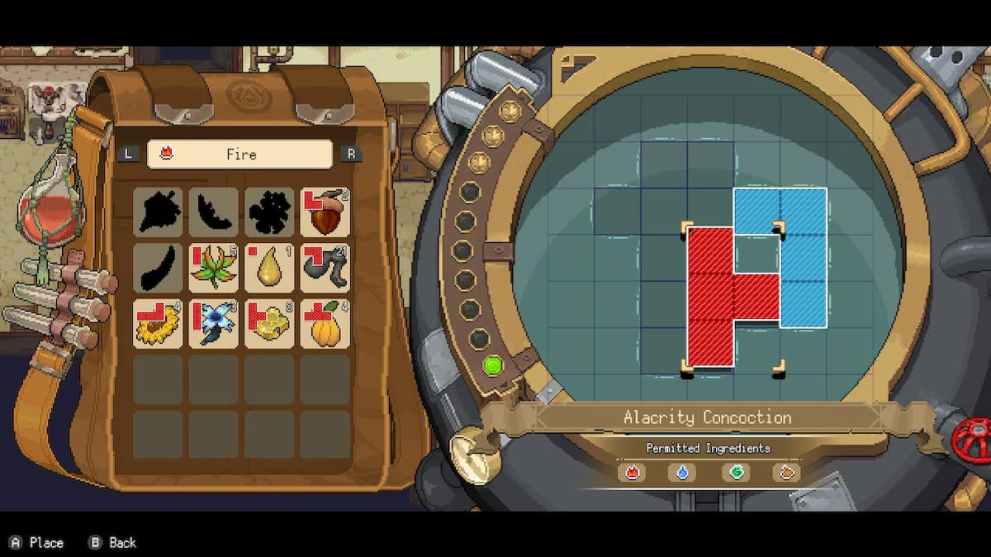
The cauldron at your home has a limited capacity of materials when you first start so you’ll only be able to use up to five materials. There are many ways to solve each puzzle, but this mechanic does become surprisingly difficult as you progress through the story.
At first, potions are incredibly easy to make but it becomes really satisfying when you are able to brew a large potion that only allows for one element. You feel like you went out of your way to gather the correct materials and make a true medical breakthrough.
You can upgrade the tools, cauldron, and mailbox, and even make repairs to your home and clinic to unlock more features. As mentioned earlier, the cauldron is limited to five ingredients when you start, but you can upgrade it to hold up to 10. Stronger tools will save stamina and allow you to collect enough wood and stone to upgrade all your other facilities.
Unfortunately, upgrades can really start to drag and feel like an unnecessary grind. For one, all the upgrades require money, wood, and stone to perform. You’ll find yourself chopping down trees and smashing rocks over and over and over just to progress the story a little further.

Upgrading tools does make the process a lot faster, but you still have to collect wood, stone, and money to upgrade the very tools used to collect those same resources. Outside of the tools and cauldron, you can also upgrade your home, clinic, mailbox, and even some of the other shops and facilities.
Upgrading your home will unlock the kitchen and cooking, upgrading the clinic will give you more potions to brew, and upgrading your mailbox allows you to sell more potions at once. Unfortunately, with every upgrade competing for the same materials, players are constantly forced to prioritize other upgrades and delay unlocks for more features.
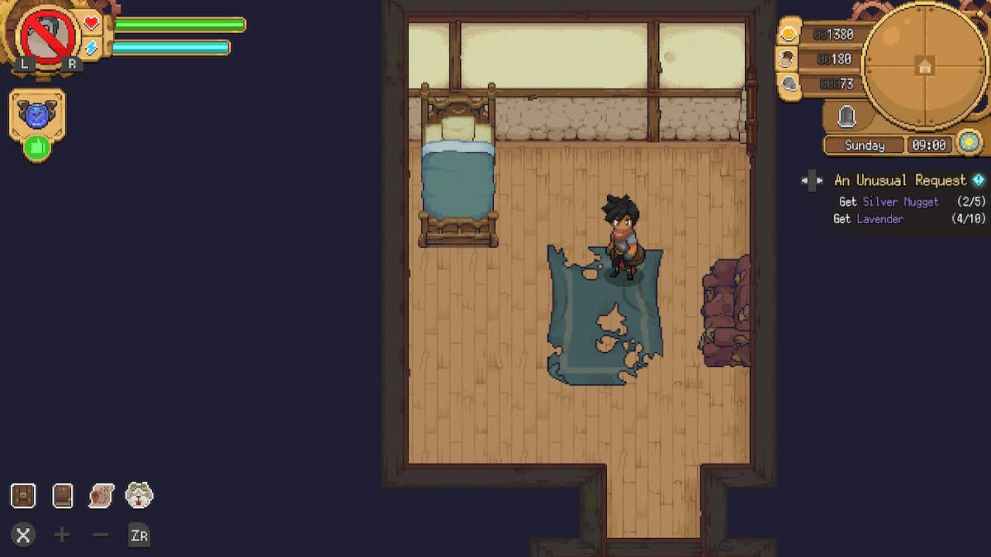
This means that you can go quite a while before you unlock the cooking mechanics or the furniture store so you can further decorate your run-down room. Of course, furniture also requires money, wood, and stone so you’ll be back to grinding those resources. The one relief to this process is upgraded tools and later areas where the materials are more plentiful.
The social aspects lead to some of the more exciting gameplay like tasks and relationship level-up quests. Speaking to a character will increase your trust level between them and once you max out the bar, you can trigger an event or quest that will take them to the next level.
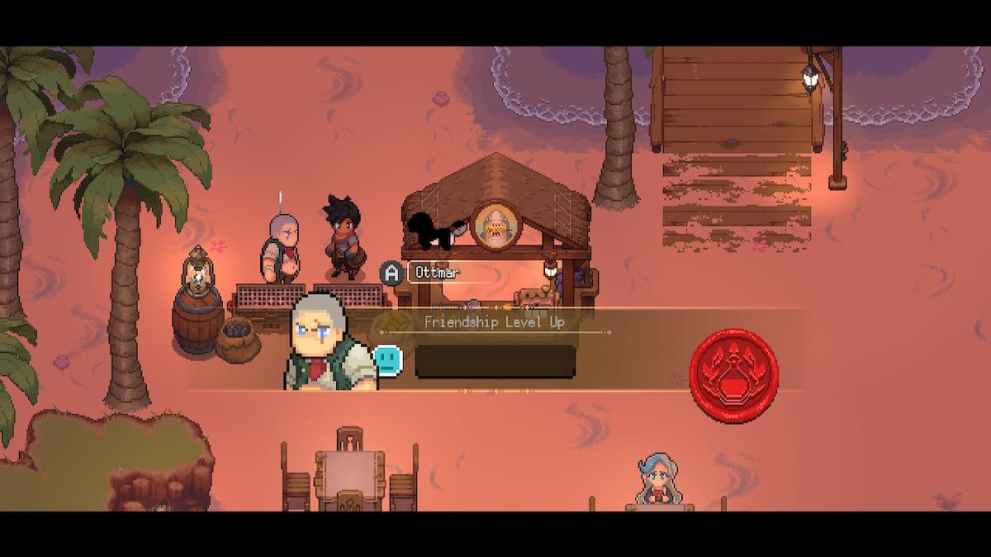
These quests may have you brew special potions, collect materials to make special deliveries, and head to locations to see cutscenes that allow you to learn more about the characters. Once you boost your relationship, you’ll unlock another page on the character’s profile so you can always read back and remember their stories.
You can even increase your relationship with your dog by petting and feeding them. As your relationship with your pet goes up, they will unlock abilities like digging for materials and tracking down specific residents in the town.
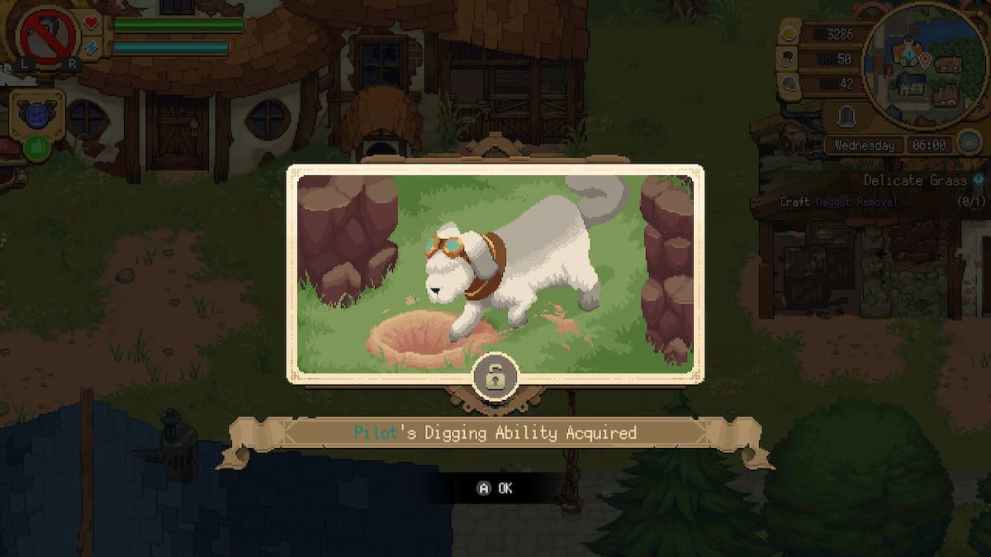
There are some romanceable characters, but the list is surprisingly slim as of right now. There really aren’t too many marriage candidates even though it seems like many of the characters would be suitable for the role.
The romance system, along with some of the side features like part-time jobs, fishing, and decorating, gives Potion Permit a bit of an unfinished feel. The mini-games you play for part-time jobs aren’t very deep or interesting to perform. Most just require pressing the joystick in the correct direction.
This gets to the discussion about bugs in the game and there are plenty of them. During my playthrough, I encountered a good amount of frame rate drops, skipped frames, and even the game freezing here and there forcing me to restart the software and lose a day’s progress.
The only point the game saves is when you go to sleep, so you’ll have to complete a full day before safely exiting the game and doing something else. This led to another problem where a lot of fast travel points would suddenly deactivate after resetting, forcing me to walk to the travel point to activate it at the start of every play session.
Some fast travel points also wouldn’t load areas properly so you were better off walking there manually or exiting and entering the area after arriving to get the enemies and materials to spawn. There were quick workarounds, but it did become an annoyance when trying to rush through to get some wood or stone.
There is an arcade downstairs in the pub, but the whack-a-mole game didn’t work and I was never able to actually try it. On some occasions, the game wouldn’t load onscreen information and would miss some of the finer details when engaging with a minigame or character.

The most positive thing about the bugs was that I didn’t encounter anything game-breaking that would cause me to lose my entire save or start from scratch. Besides that, Potion Permit definitely needs some more polishing to make the experience smoother.
Potion Permit has a solid skeleton that needs some fleshing out. The tasks around story quests and relationship quests are engaging and lead to great gameplay moments that bring all the elements together. The town is incredibly charming and gaining the town’s trust is consistently rewarding.
Of course, other aspects of those goals fall short. The mini-games are not too exciting and a lot of the other life sim aspects feel like an afterthought because it takes so long to unlock them. Not to mention the bugs you’ll run into along the way that also bring down the experience. It’s hard to deny that the ideas behind Potion Permit are great, but it doesn’t quite reach the level where the gameplay becomes truly captivating.
- Deep story quests.
- Rewarding relationships.
- Variety of tasks.
- Lots of upgrades.
- Unengaging mini-games.
- Grindy late game unlocks.
- Performance issues.

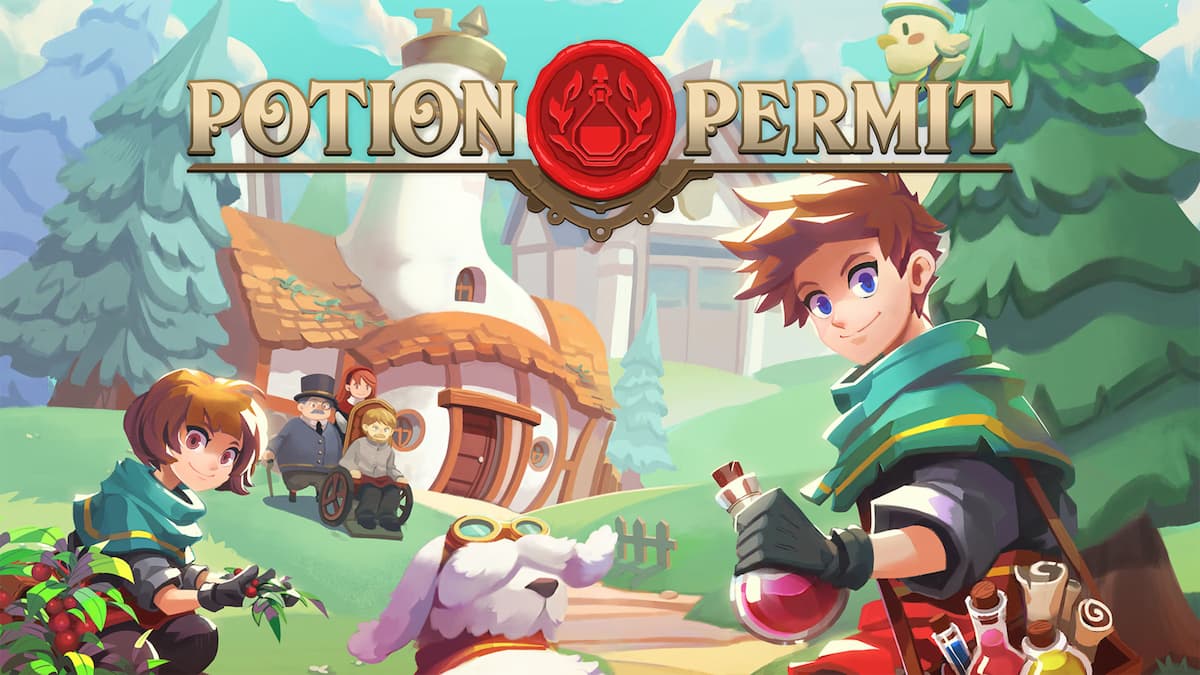

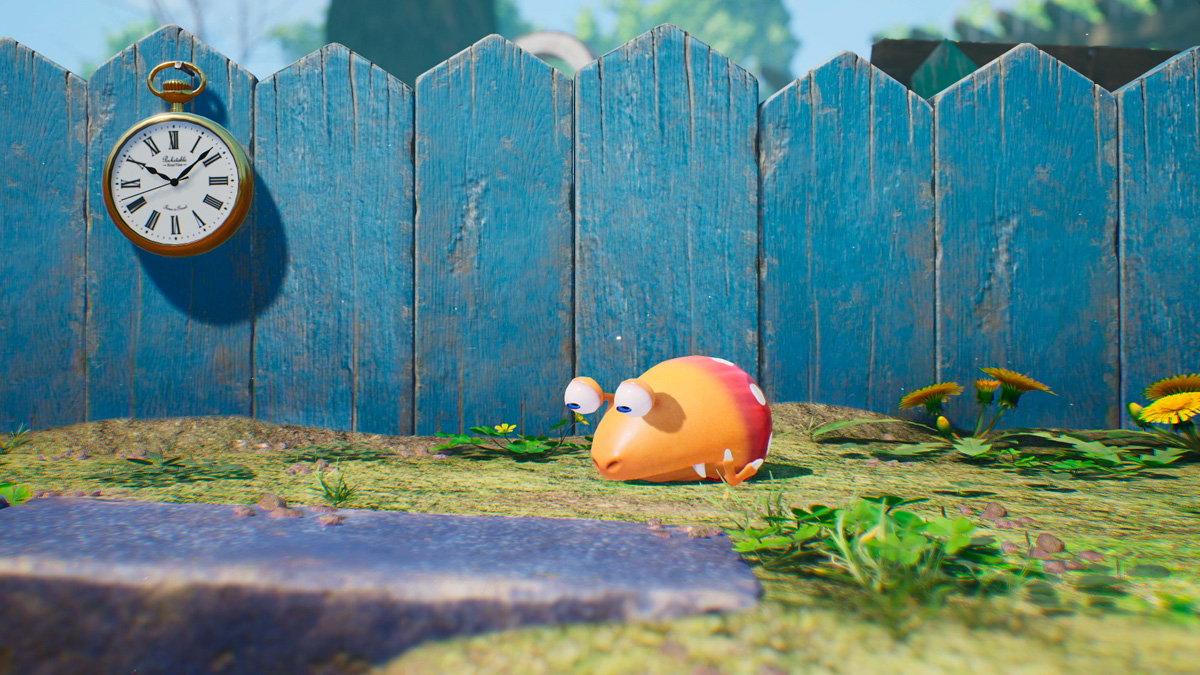


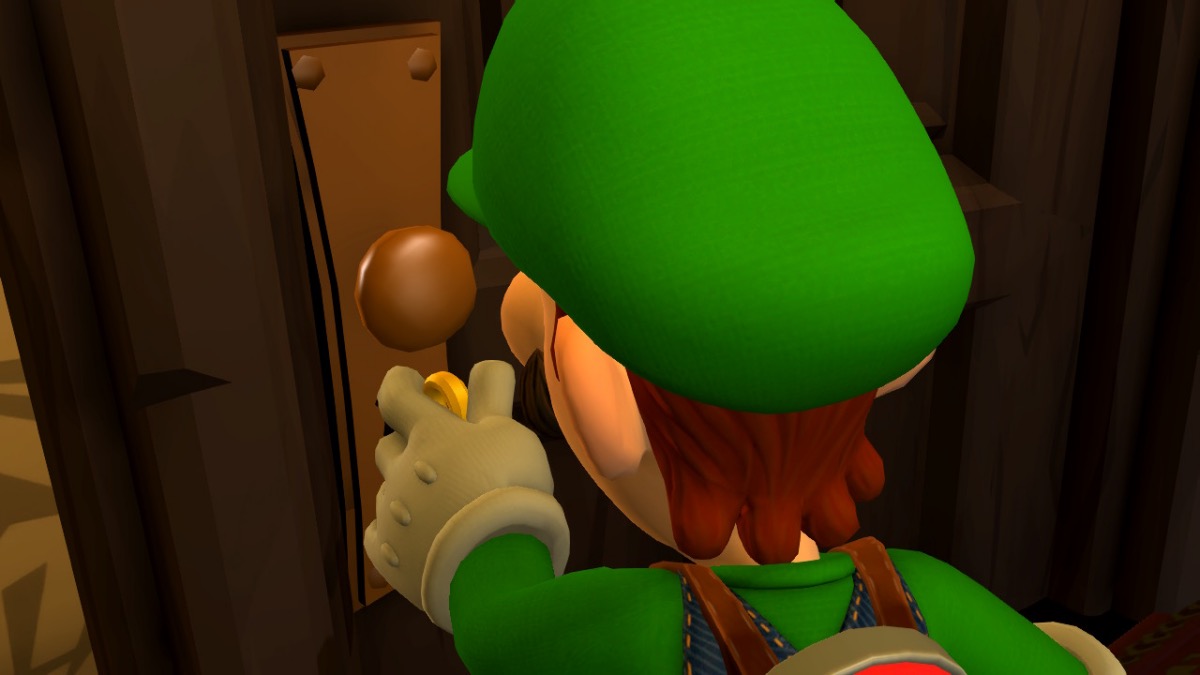






Updated: Sep 22, 2022 09:51 pm